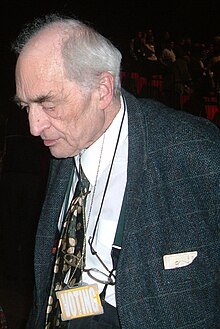Conrad Russell, 5th Earl Russell
|
The Right Honourable The Earl Russell |
|
|---|---|

Lord Russell at the Liberal Democrat Federal Conference in Brighton, September 2003
|
|
| Personal details | |
| Born |
15 April 1937 Harting, West Sussex |
| Died | 14 October 2004 (aged 67) London (Park Royal) |
| Nationality | British |
| Spouse(s) | Elizabeth Sanders |
| Alma mater | Oxford University |
| Occupation | politician, historian |
| Profession | academic |
Conrad Sebastian Robert Russell, 5th Earl Russell (15 April 1937 – 14 October 2004) was a British historian and politician. His parents were the philosopher and mathematician Bertrand Russell and his third wife Patricia Russell. He was also a great-grandson of the 19th century British Whig Prime Minister Lord John Russell. He succeeded to the earldom on the death of his half-brother, John Russell, on 16 December 1987.
Educated at Eton (King's Scholar) and Merton College, Oxford, Conrad Russell was an academic historian working on 17th century British history, having extensively written and lectured on parliamentary struggles of the period. Russell was also a passionate advocate of liberalism, from a long family line of distinguished liberals.
After his death from complications of emphysema, Russell was succeeded as Earl by his elder son, Nicholas Lyulph, who died in 2014 and was succeeded as Earl by his brother, John Francis, who is also a politician.
Russell was a revisionist historian working on the origins of the English Civil War and critical of older Whig and Marxist interpretations. His major works include Crisis of Parliaments: English history 1509–1660 (1971), Origins of the English Civil War (edited, 1973), Parliaments and English politics, 1621–1629 (1979), Unrevolutionary England, 1603–1642 (1990), and Fall of the British monarchies, 1637–1642 (1991). His work on early Stuart Parliaments was profoundly influenced by the work of Alan Everitt, who had argued that the English gentry were preoccupied with defending their positions in the localities rather than responding to the demands of the Crown. This no longer seems entirely plausible in the light of the work done by Richard Cust, Clive Holmes, Peter Lake and Christopher Thompson. Russell argued that the English civil war was much less a result of long term constitutional conflicts than had previously been thought, e.g. by Lawrence Stone and Christopher Hill, and that its origins are to be sought rather in the years immediately preceding the outbreak of war in 1642 and in the context of the problems of the multiple kingdoms of the British Isles, a hypothesis for which he was indebted to the pioneering study of H. G. Koenigsberger. This area is still being explored by historians like John Adamson and David Scott even if their detailed conclusions vary from those reached by Russell.
...
Wikipedia
